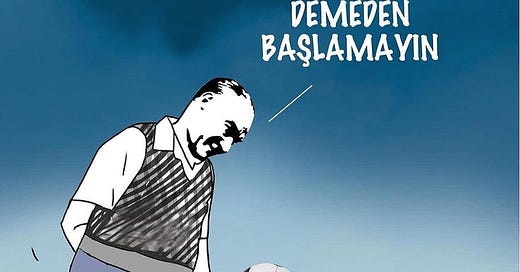If you follow Turkish politics, you’ll have noticed a whirlwind of angry social media posts last night. I usually don’t comment on such things, but what the hell, I’m bored.
So what happened?
Fenerbahçe and Galatasaray, two of Turkey’s biggest soccer teams, were apparently due to face off in Riyadh, Saudi Arabia. I say “apparently,” because I don’t really follow sports, and I don’t think a lot of people were aware of the match either. Turkish soccer is wildly popular, but not very good.
Anyways, it turns out that the Saudis asked the two teams to refrain from wearing t-shirts with the image of Mustafa Kemal Atatürk, the founding father of modern Turkey. Fans were also prohibited from displaying the founding father’s likeness in the stadium.
So if you’re Turkish, you’re sitting around, drinking tea on a Saturday afternoon, and the news on your phone is this: the Saudis are banning Atatürk from a big, big Turkish sports event.
All hell broke loose. Because of course it did. Both teams and their fans departed Saudi in a huff. Opposition TV stations went nuts, blaming the government for ever letting something like this happen. The CHP mayor of Ankara renamed the street where Saudi embassy is located, and an Istanbul mayor had Atatürk imaged hung up in front of the Saudi consulate in Istanbul.
I’m not going to get into the details of why this happened, whether it was an actual ban, who was right and who was wrong, etc. What matters here is the explosive reception in the early hours of the news.

Turkey’s Islamist tradition is explicitly against Atatürk. Always has been. Look at the poets and polemicists that Erdoğan and his fellow Islamists revered in their youth, and there’s absolutely no doubt about that.
While that Islamist tradition is now in power, they’ve found that Atatürk is simply too powerful a figure to tear down over night, or even within a single generation. Erdoğan would never have won a campaign by campaigning explicitly on his anti-Kemalist beliefs. So he re-interpreted the man. His Atatürk isn’t the founder of a secular Westward-looking Republic, but the hero of Gallipoli and the general of the Turkish War of Independence, a man who valiantly fought off Western powers (for more on this, read Nick Danforth’s excellent essay).
Turkish officials generally emulate Erdoğan’s nuanced stance on this issue. That’s why, when this crisis erupted, AK Party spokesperson Ömer Çelik made a dry statement condemning the Saudis and thanking citizens for their support.
But most people don’t really buy it. The opposition feels like it’s being gaslit (because it is) and they’re always on the lookout for flashes of the regime’s anti-Kemalist face comes into focus. And that’s what they saw in this. The news suggested that Turkish authorities had agreed to an Atatürk ban, but that the teams backed out last minute. When the news broke, Kemalists felt like their long-held belief was confirmed. Atatürk’s legacy was in danger.
The regime’s problem is that its collective re-interpretation (or gaslighting) takes a lot of energy and coordination. Most of the time, their elite kind of emulates Erdoğan in obfuscating its anti-Kemalism, but they do let things slip every now and then, especially when foreigners are involved. My guess is that the Saudis probably thought that most Turks are like the people they do business with, and the people negotiating the deal probably thought that they could figure things out on game day. They got sloppy.
Part of the issue was that it wasn’t just any country banning Atatürk, it was Saudi Arabia. Most forms of Turkish nationalism will assert some kind of superiority over Arabs, especially the Gulfies, whom they consider to be tribal and generally “backwards.” This is all the more painful an issue considering that Kemalists today feel economically and politically disempowered. Not only are they firmly under the heel of an Islamist regime, but that regime also appears dependent on the munificence of the Saudi-led Gulf. Behind the anger, therefore, lies desperation, the idea that Turkey is weak and up for sale.
When I logged on Twitter/X last night, pro-regime accounts were pretty upset with the whole thing. They claimed that it was an “operation” by unnamed powers, that it wasn’t really about Atatürk but about making the Erdoğan palace look weak. Many hinted that this was a bit like Gezi, meaning that they half-expected public protests and coup attempts (they refuse to see a difference), which of course, was ridiculous.
More generally though, I don’t think that serious people in the Erdoğan palace are worried about this. This kind of Kemalism has long been hollowed out of its Republican content. It’s now reduced to a commodified, fetishized, racially-tinged identity, and though it will keep bothering the palace in the foreseeable future, it won’t really be a threat to them.



